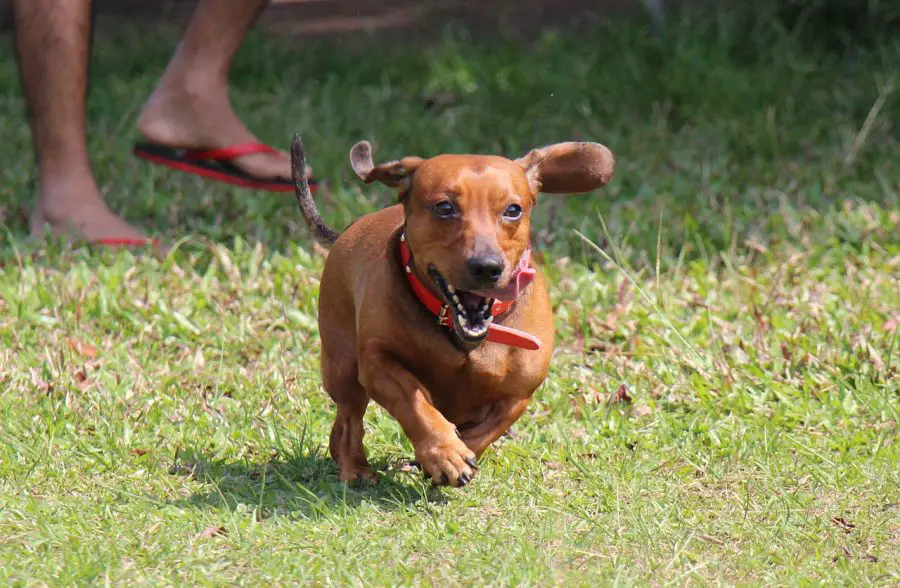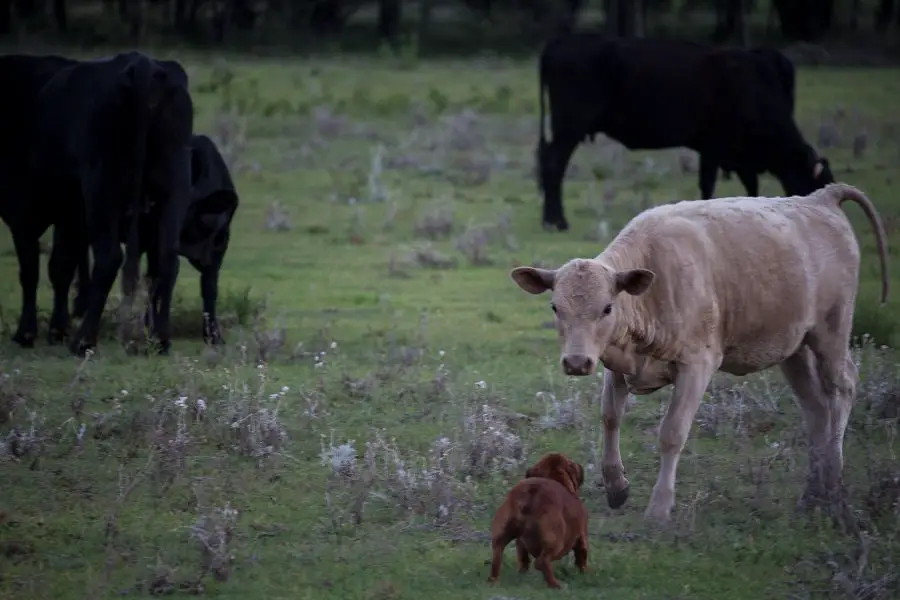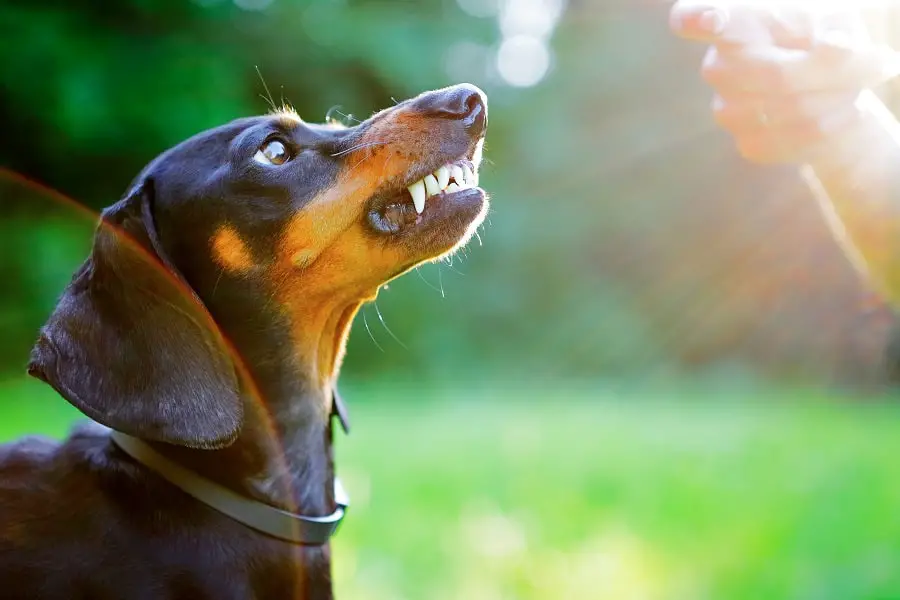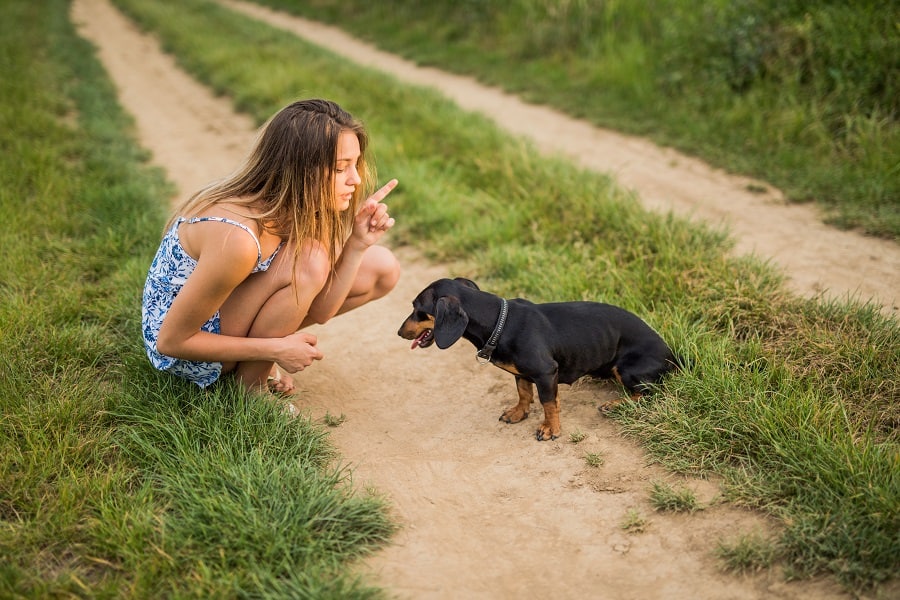An often quoted study at the University of Pennsylvania tested 32 common dog breeds for the likelihood of biting or trying to bite others.
To the surprise of many, the results did not place the likely candidates like the Rottweiler or the Pit Bull Terrier at the top of the list of most aggressive breeds.
The Jack Russell Terrier came in third, the Chihuahua ranked second and the top spot in this rather disreputable list was won by the very innocent-faced Dachshund.
Are these small, fragile-looking dogs really the most aggressive in the canine kingdom? Have we been hiding a monster inside our homes?

The simple answer is no – dachshunds are still the utterly lovable dogs that you have known them to be. Ideal as house pets, they also double up as efficient watch dogs.
But, as we will see, the breed’s genetic make-up does impart it with certain qualities that can manifest as aggressive behavior if the dog is not trained properly early on.
The dachshund is a fearless, forthright animal, which needs the right care and instruction to develop into the perfect pet, with the onus completely on the owner.
Understanding the Dachshund Breed
While every dog has a personality all its own, it helps to appreciate that a good deal of the behavior of an individual dog finds its root in the specific purpose the breed was developed for.
It is no different with dachshunds. The breed was developed in Germany over 600 years ago to hunt badgers.
These dogs would relentlessly follow the prey, with their low-set bodies helping them dig into the badger den.
The dogs had to be fearless, clever and strong enough to battle their sharp-teethed quarry.
A stubborn nature that allowed them to persevere through difficult hunts helped as well.
These qualities of the perfect hunter have found their way over generations into the present day house pet.
So what might appear as aggressive behavior are just the dog’s natural instincts coming to the fore.
Small dog breeds, in general, also have the propensity to be snappy, stubborn and jealous.
Dachshunds, especially untrained ones, are likely to display some of these tendencies too.
Aggression towards Animals

The dachshund’s predatory nature is visible in its interaction with other animals.
While it might not be a great companion for smaller pets like hamsters or ferrets, it also doesn’t mind going up against bigger dogs.
Early socialization and obedience training are the only ways to help a dachshund be comfortable in the company of other animals.
Aggression towards Strangers

Dachshunds are not naturally predisposed to be friendly to strangers, with the primary instinct being to protect their turf.
While this makes them excellent watchdogs, it can also be a risk to house guests or in public settings.
On coming across strangers, a dachshund that is not properly socialized will growl, bare its teeth and bark.
Some dogs could nip at strangers’ feet or bite too. Running aggressively towards mailmen or chasing cars fall in this category of behavior as well.
The other reaction from an unsocialized dog could be an attempt to hide from the person it is not familiar with.
Any forced effort by the stranger to pat the dog or get friendly will result in snarling or biting.
Aggression towards Owners
As we will see, there are certain forms of aggressive behavior, like dominance and food-related aggression, where dachshunds can turn against their owners too.
Though such situations are rare, owners should be careful while handling an irritable dog.
Particular care should be taken when adopting an older dachshund because its behavior patterns are already set and it needs that extra bit of effort to help it settle down in a new home.
Reasons for Aggressive Behavior
Do not let this discourage you, though. Dachshunds are extremely loyal, and generally friendly dogs that make for excellent pets.
In most cases, there is an underlying reason for the aggression, which needs to be understood and resolved.
These reasons could include dominance, territorial behavior, possessiveness, anxiety or boredom.
In fact, aggressive behavior that can be linked to a specific object or situation – food, leash, fence, etc. – can be resolved relatively easily by removing the source of the problem.
But aggression could also be linked to a more deep-set emotional issue caused by insufficient socialization or trauma.
The behavior is likely to be more serious in such cases, with trigger points difficult to predict, and professional help becoming imperative.
Aggression can also manifest as biting, which is a more serious condition.
When a dachshund tries to bite while its ears are pinned back along the head, it is most likely a defense mechanism borne out of fear and anxiety rather than pure aggression.
Dominance

Dachshunds were bred to hunt in packs, with the alpha leading from front.
This has led to an innate tendency in these dogs to try and dominate other individuals around it, whether they are animals or human family members.
From an early age, dachshunds try to establish their dominance by baring their fangs even during play.
If unchecked, such behavior can result in an adult dog that considers itself the master of its domain, prone to attacking another animal or human if its dominance seems under threat.
Related to this is leash aggression, in which the independent-minded dachshund tries to chart its own course.
If not checked early on, you can end up with a pet that is unruly on a walk at the best of times and a danger to other animals and pedestrians at the worst.
Territorial Behavior
Dachshunds tend to be very protective of their homes.
Any new entrant is met with a growl or a bark, which can quickly turn aggressive if the owner hasn’t trained the dog to control its instincts.
With proper training and socialization, a dog can learn to distinguish between friendly strangers and actual intruders.
Possessiveness
Dachshunds have an acute sense of ownership, and are known to stash away their favorite toys and bones.
This can be cute till the dog starts snarling at or even biting anyone who appears to take these items away.
Aggression can also be exhibited towards other pets that might appear to displace the dog from the owner’s lap or bed.
Early socialization and confidence that these possessions will not be taken away if shared can help tackle this.
Food Aggression
Similar to possessive behavior is aggression related to food. This could be because of food scarcity encountered in early years or simply an in-born tendency to protect their food.
Dachshunds displaying this behavior can even bite their owners if disturbed during meal times.
It can be prevented by early conditioning – regular feeding schedule, feeding with your own hands occasionally, touching the puppy calmly while it is eating, and adding small portions to the bowl so that the puppy identifies you as a food giver, not a taker.
Fear or Anxiety

Fear is a natural response in a dachshund considering that even children and most other dogs it comes across are larger than it in size.
This can be compounded if the dog has not been socialized as a puppy.
Owners need to appreciate the very real anxiety felt by the dachshund in new situations and should be patient.
Forcing the dog into situations that it cannot cope with can make the condition worse.
Visitors should be advised against approaching or patting the dog until it is comfortable on its own to come out and meet, and taught to be gentle when interacting with an anxious dog.
Boredom
Dachshunds are high energy dogs.
While they do not require intensive exercise because of their small size, a proper outlet in the form of playing within the house, in a fenced area, or a moderate walk is necessary.
A bored dachshund can act out in different ways – by lunging at people, by barking at other dogs or by digging up the garden.
Supervised activity to address the boredom coupled with command training to control behavior like excessive barking and digging can take care of this.
If you do not have sufficient time to spend with your dog, hiring a dog walker or using the services of a day care facility can be a good idea.
As a Puppy

Dachshund puppies can be quite feisty and their aggressive behavior is often reinforced because it appears endearing to begin with.
Commands like “sic ‘em” or tolerance of playful biting, which is very pronounced when the dog is teething, can encourage aggressive behavior.
By the age of about 10 weeks, the dachshund puppy is ready to begin training, and should be engaged in reward-based instruction right away.
Mistakes should never be punished harshly as it can have counter-productive effects.
Male vs. Female Aggression
Male-to-male aggression is the most common among dachshunds.
Females of the breed are relatively more docile. Neutering of the male dachshund and spaying of the female can help decrease the tendency for aggressive behavior.
Training

Dachshunds are clever dogs and their aggressive nature can be easily controlled, and even properly channeled, if trained from an early age.
Training requires patience, and the breed’s independent nature can be trying for an inexperienced owner.
Professional help is ideal for such situations, or if the dog is particularly aggressive. Here are some key points that need to be kept in mind in relation to a dachshund’s training:
Socialization with other dogs and obedience training from an early age (between 10 to 14 weeks) is essential.
Training should never involve shouting or punishment; progress should always be rewarded.
Establish your dominance from an early age. Dachshunds are pack animals and respect the leader. Simple steps like eating before the dog does, entering the house before it or discouraging it to pull the leash can help it understand who the leader is.
Avoid games that involve chasing as this can encourage their hunting instincts and trigger aggressive behavior.
Aggressive behavior or biting at an early stage is often ignored because it might appear harmless or cute – avoid this as it can develop into a major issue as the dog grows older.
Discourage excessive barking. It helps to understand the cause of the barking and removing it if possible.
Spend quality time with your dog. Excessive barking or aggressive behavior can be caused by the need for attention or boredom. Playing and cuddling up for some time everyday will keep the dog emotionally satisfied.
Do not leave the dog alone for long periods. Dachshunds crave company, and leaving a dog alone when it is not used to it can be difficult for it to cope with.
Do not hesitate to seek the help of a professional trainer.
These tips can ensure that most of the reasons for aggressive behavior listed above are tackled early on, with your dachshund growing into a loving and much-loved member of the family.
